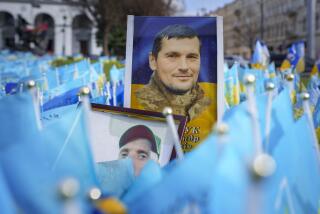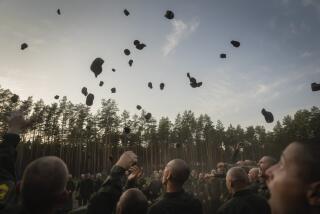Russia Will Create Its Own Army : Military: Yeltsin decree is expected as an accord on unified forces eludes the Commonwealth.
- Share via
MOSCOW — Russia has decided to form its own army because it has failed to win support for its drive to keep the bulk of the former Soviet armed forces united, a top adviser of Russian President Boris N. Yeltsin said Wednesday.
Yeltsin will issue a decree creating the Russian armed forces soon after the leaders of the 11 former Soviet republics that make up the Commonwealth of Independent States meet later this week in Minsk, the capital of Belarus, Col. Gen. Dmitry A. Volkogonov, the Russian president’s military adviser, told the Nezavisimaya Gazeta newspaper.
“More than once, Russia has stated that it will not be first to create armed forces,” Volkogonov said. “But after the Minsk meeting, the moment will come when we need to declare the creation of our own Russian army. There will be a presidential decree. Most likely it will be after Feb. 14.”
Russia’s decision to proceed with its own military is an indicator of the further fraying of the ties that bind the republics of the old Soviet Union and a signal of the impending demise of the world’s largest military force.
Until now, Russia had pressed to maintain joint forces with the other former republics. But officials from Ukraine, the second-largest power in the Commonwealth, have insisted that a Ukrainian army is an indispensable part of independence.
Volkogonov said the Russian military would not need more than 1.5 million troops, which would make the force about the size of India’s military. There are 3.7 million people now serving in the armed forces of the former Soviet Union.
Although the laws creating a Russian military have not yet been passed by the legislature, Volkogonov said it is likely that the Defense Ministry will be a civilian organization; during a transition period, however, it may be headed by a military figure.
The Russian army, he predicted, also will become a professional force, contrasted with the current military, which is manned largely by conscripts.
The leadership of the former Soviet Defense Ministry also called on Russia to create its own armed forces, reversing its position on the controversial topic, Nezavisimaya Gazeta reported.
The fate of the former Soviet armed forces has been billed as the central topic of a meeting on Friday among Yeltsin and the heads of the other former Soviet republics that joined the Commonwealth.
Although the Commonwealth leaders agreed at their last summit six weeks ago to permit the former republics to form their own conventional armies, there has been deep disagreement--especially between Russia and Ukraine--over how the former Soviet forces will be divided; the two Slavic republics have openly feuded, for example, over control of the Black Sea Fleet.
Commonwealth members also have been unable to decide on the structure, legal basis and funding for their joint strategic forces. In a televised interview earlier this week, Moldova’s Prime Minister Valery Muravsky said his country will not help finance the Commonwealth armed forces but only those forces under Moldovan control.
Air Marshal Yevgeny I. Shaposhnikov, commander of the Commonwealth forces, has been in Minsk this week working with defense ministers of the Commonwealth states to try to smooth out differences before the leaders meet on Friday. He stressed in an interview with a Russian newspaper that, although there are differences in approaches, all of the leaders in the Commonwealth “treat their nuclear forces very seriously.”
“The situation concerning strategic forces is clear: They are all under single control, under single command,” he said. “As for tactical nuclear weapons--which at present are located only in the territories of Ukraine, Belarus and Russia--there is an agreement that they will be fully relocated to Russian territory. This relocation will be completed by midsummer.”
But in Ukraine, political leaders are growing wary of sending their tactical weapons across the border because they are not convinced that Russia is destroying them.
“We do not have an interest in stockpiling weapons in Russia,” said Vasyl Durdinets, deputy chairman of the Ukrainian Parliament and a member of Ukraine’s delegation to the Minsk summit. “Our principled position is to ensure that they can’t be used.”
The proposed Russian army would be much bigger than Ukraine’s military, which originally was envisioned as a 400,000-soldier force but now, according to President Leonid Kravchuk, might be only a 90,000-member force. Kravchuk claims that 1.3 million troops--or about one-third of the former Soviet military--are now based in Ukraine.
Ukraine continues its effort to shape its military, with Lt. Gen. Valentin Borishkin saying Wednesday that almost 13,000 of the 17,000 officers of the former Soviet Red Army in the Kiev region have taken a required oath of allegiance to Ukraine, Interfax news agency reported. According to an earlier report by Interfax, about 1,000 army units are expected to be transferred to Russia for refusing to take the oath.
Times special correspondent Mary Mycio in Kiev, Ukraine, contributed to this report.
More to Read
Sign up for Essential California
The most important California stories and recommendations in your inbox every morning.
You may occasionally receive promotional content from the Los Angeles Times.













